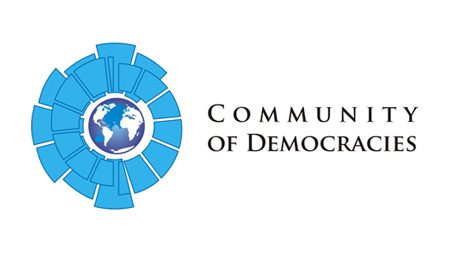Democracy Online vs. Democracy Offline- Permanent Secretariat of the Community hosts a panel at the Warsaw Dialogue for Democracy


October 30, 2013
New technologies are changing the way we understand democracy. Participation, representation, contact with the government, access to information – all of these features of democracy are influenced by new technologies. The new technologies have generated several myths, and some even credit them with sparking recent revolutions around the world, calling them “Facebook revolutions”. But how much of this is true? How do new technologies change democracy, and how can they be used to support and strengthen democratic practices around the world? These were the questions under debate on the panel “Democracy Online vs. Democracy Offline”, organized by the Community of Democracies at the Warsaw Dialogue for Democracy.
The Warsaw Dialogue for Democracy, instituted by the Ministry of Foreign Affairs of Poland, is a rapidly expanding stage for international debate on various topics of democracy. Its 2013 conference included panels on transitional justice and gender equality, and enjoyed the participation of respected guests, among them Minister of Foreign Affairs of Poland Rados?aw Sikorski, Executive Director of the European Endowment for Democracy Jerzy Pomianowski, and Nobel Peace Prize laureate Shirin Ebadi.
The panel "Democracy Online vs. Democracy Offline" included a number of experts from several fields and countries, presenting diverse perspectives on the relation between technology and democracy. The panelists presented concrete initiatives and ideas to support democracy through technology, many of which can be adopted by government, IT companies and international organizations. Ivar Tallo, founder of the Estonian e-Governance Academy, and Tarik Nesh-Nash, Director of Software Centre Morocco, presented cutting-edge initiatives that aim to increase direct citizen participation and simplify the flow of information to the citizens, increasing government transparency. Online monitoring of elections and parliamentary work, budget transparency tools and virtual debate on the constitution were only some of the projects presented.
Prominent democracy activists Esraa Abdel Fatah, vice-chairman of the Egyptian Democratic Academy, told about her experiences using social media to inform and engage during protests in Egypt, and discussed the many obstacles imposed by governments to interfere with the activists' work. "When I speak here, the 100 people present in this room hear my message. But when my friend tweets it, immediately all our 300,000 followers hear it!" said Abdel Fatah to demonstrate the power of social media to engage people in debate.
Andreas Gross, member of the Swiss Parliament and the Parliamentary Assembly of the Council of Europe, and Irena Guidikova, head of division of the World Forum for Democracy of the Council of Europe, spoke as well about the numerous possibilities that the internet offers for democracy, and encouraged states to embrace these opportunities.
Following the discussion, panelists summarized a shortlist of concrete recommendations, which will be presented to the European Endowment for Democracy and at the World Forum for Democracy in Strasbourg. These are some of the panelists' recommendations:
Apply, globalize, institutionalize and constitutionalize the democratic norms of freedom of speech in the internet.
Profit from the internet's ability to facilitate direct civic participation.
Include good governance in the United Nations post-2015 development goals.
Support and protect internet activists and administrators of pro-democracy websites around the world, and host the websites themselves in safe servers in democratic countries.
Support the development of a technology that will eliminate the possibility of any country's government blocking the internet stream.
Support the development of technologies and initiatives meant to overcome the digital gap, increasing digital literacy and access to the internet everywhere in the world.
Support technological hubs for government transparency and monitoring.
Support research and development for technology and democracy.
Monitor the growing privatization of the democratic discourse in the internet.
Create an international network of online activists for democracy.



